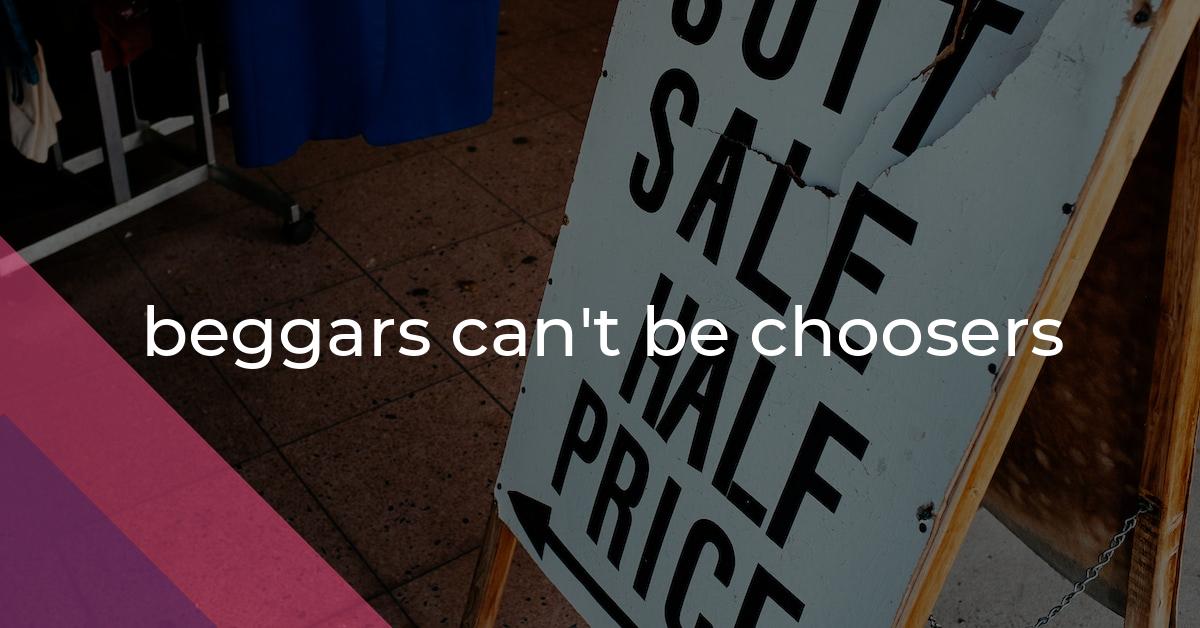beggars can’t be choosers: Idiom Meaning and Origin
What does ‘beggars can't be choosers’ mean?
The idiom "beggars can't be choosers" means that when in a desperate situation, one cannot have high expectations or be selective about what is given or offered.

Idiom Explorer
An idiom that means someone is very poor and has no money.
The idiom "easy pickings" means something that is very easy to obtain or achieve, often because it is unguarded or vulnerable.
The idiom "easier said than done" means that something is much more difficult to accomplish than it sounds or appears to be.
The idiom "down and out" refers to someone who is in a hopeless or desperate situation, often financially or emotionally. It describes someone who has hit rock bottom and is struggling to recover.
The idiom "doomed if you do, doomed if you don't" refers to a lose-lose situation, where any choice or action will lead to negative consequences or a bad outcome.
The idiom "don't hold your breath" means to not expect something to happen or to not have high hopes for a particular outcome.
The idiom "dog's chance" refers to having very little or no possibility of success or survival in a given situation.
The idiom "dog in the manger" refers to someone who selfishly prevents others from enjoying or using something that they themselves do not need or want.
The idiom "dirt-poor" refers to someone who is extremely poor or impoverished. The term "dirt" implies a level of destitution that is lower than "poor", emphasizing the dire financial situation of the person. The idiom is often used to convey an extreme or severe level of poverty.
The idiom "damned if one does and damned if one doesn't" means that no matter what action or decision one takes, they will face negative consequences or criticism.
The Origins of Picky Beggars
The idiom "beggars can't be choosers" is a well-known expression that reminds individuals in disadvantaged positions to be grateful for what they receive, even if it does not meet their exact preferences or standards. The term "beggar" refers to a person who is impoverished and relies on the charity or help of others to meet their basic needs. The verb "choose" implies the act of making a selection based on personal preference or desire. In the context of this idiom, it suggests being able to select or decide among different options, indicating a certain level of privilege or luxury.
When one is in a position of need, it is crucial to be less selective and accept what is available, rather than demanding or expecting more. The idiom "beggars can't be choosers" serves as a reminder that individuals in desperate situations should not be overly selective or demanding, but rather be grateful for any assistance they receive.
The exact origin of this idiom is uncertain, but it is believed to have originated in medieval Europe, where begging was prevalent due to widespread poverty. It likely emerged as a way to express the idea that those in desperate situations should not be too demanding or specific about the assistance they receive.
This idiom has become deeply ingrained in the English language and is often used in everyday conversations, literature, and various forms of media. It continues to serve as a reminder to be humble and appreciative of any help or assistance one receives, regardless of its suitability to individual preferences.
Related to the idiom "beggars can't be choosers" are the idioms "two pennies to rub together" and "all duck or no dinner". These idioms all convey the idea of limited options or resources and the need to be grateful for what one has.
The idiom "two pennies to rub together" refers to a state of extreme poverty or financial difficulty. When someone does not have "two pennies to rub together," it means they are unable to meet even their basic needs. This idiom emphasizes the idea that individuals in such dire circumstances have no room for being selective or demanding.
Similarly, the idiom "all duck or no dinner" reflects the notion that in certain situations, one must accept what is available or risk having nothing at all. This phrase originated from the practice of hunting ducks, where if one did not successfully catch a duck, there would be no dinner. It highlights the importance of being content with what one can attain, even if it may not be ideal or meet all of their desires.
The idiom "beggars can't be choosers" reminds individuals in disadvantaged positions to be grateful for what they receive. It originated in medieval Europe and serves as a reminder to be less selective or demanding when in need. Related idioms such as "two pennies to rub together" and "all duck or no dinner" also convey the idea of limited options and the need to appreciate what one has. These idioms emphasize the importance of humility and appreciation in times of need and scarcity.
Example usage
Examples of how the idiom "beggars can't be choosers" can be used in a sentence:
- A job applicant with no experience should accept any offer they receive, as beggars can't be choosers.
- When you are in a dire situation and someone offers to help, you should be grateful and not complain about the method of assistance because beggars can't be choosers.
- If you are hungry and someone gives you a meal that you don't particularly like, you should still appreciate it since beggars can't be choosers.
The idiom "beggars can't be choosers" is used to express the idea that when someone is in a position of need or desperation, they shouldn't be selective or demanding about what they receive.
This idiom is commonly used to remind people that when they are in a situation where they are reliant on others, it is not appropriate to be picky or demanding about what they receive.
More "Proverbs" idioms



